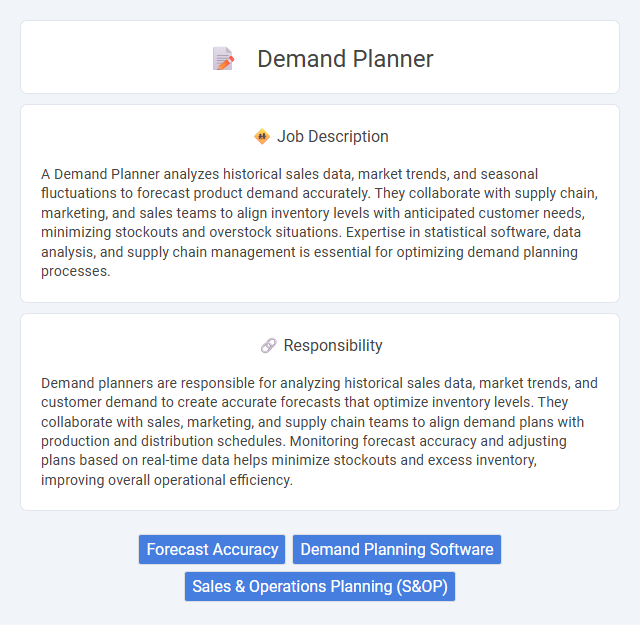
A Demand Planner analyzes historical sales data, market trends, and seasonal fluctuations to forecast product demand accurately. They collaborate with supply chain, marketing, and sales teams to align inventory levels with anticipated customer needs, minimizing stockouts and overstock situations. Expertise in statistical software, data analysis, and supply chain management is essential for optimizing demand planning processes.
People who are detail-oriented and possess strong analytical skills are likely to be well-suited for a demand planner role. Those comfortable with data interpretation, forecasting, and cross-functional collaboration may find this job aligns with their strengths. Conversely, individuals who prefer flexible, less structured tasks or have difficulty managing tight deadlines might struggle in this position.
Qualification
Demand planners require strong analytical skills, proficiency in forecasting software, and experience with supply chain management. A background in statistics, business, or logistics combined with expertise in ERP systems like SAP or Oracle enhances accuracy in demand forecasting. Certifications such as APICS Certified in Planning and Inventory Management (CPIM) validate specialized knowledge essential for optimizing inventory and minimizing stockouts.
Responsibility
Demand planners are responsible for analyzing historical sales data, market trends, and customer demand to create accurate forecasts that optimize inventory levels. They collaborate with sales, marketing, and supply chain teams to align demand plans with production and distribution schedules. Monitoring forecast accuracy and adjusting plans based on real-time data helps minimize stockouts and excess inventory, improving overall operational efficiency.
Benefit
Demand planner roles likely offer significant benefits including improved forecasting accuracy that can enhance supply chain efficiency and reduce costs. This position probably provides opportunities to develop analytical and strategic planning skills valuable across various industries. Employees might also experience increased collaboration with cross-functional teams, which could bolster communication and project management abilities.
Challenge
Demand planners likely face challenges in accurately forecasting fluctuating market trends and consumer behavior, which can impact inventory management and supply chain efficiency. The complexity of integrating diverse data sources and anticipating sudden disruptions may require advanced analytical skills and adaptability. Managing stakeholder expectations while balancing supply and demand could present ongoing pressure and require effective communication strategies.
Career Advancement
A demand planner plays a crucial role in forecasting sales and optimizing inventory levels to ensure seamless supply chain operations, making expertise in advanced analytics and ERP systems highly valuable. Mastery in data modeling and cross-functional collaboration often paves the way for progression into senior demand planning, supply chain management, or operations strategy roles. Career advancement is accelerated by continuous skill development in predictive analytics, machine learning, and global demand forecasting techniques.
Key Terms
Forecast Accuracy
Demand planners play a critical role in maximizing forecast accuracy by analyzing historical sales data, market trends, and inventory levels to predict future product demand accurately. High forecast accuracy reduces stockouts and excess inventory, improving supply chain efficiency and customer satisfaction. Advanced statistical models and demand planning software are essential tools that facilitate precise forecasting and enable data-driven decision-making.
Demand Planning Software
Demand planners utilize advanced demand planning software to forecast product demand accurately and optimize inventory management. Tools like SAP Integrated Business Planning, Oracle Demantra, and Kinaxis RapidResponse enable data-driven decision-making by analyzing historical sales data, market trends, and customer behavior. Effective use of these software solutions reduces stockouts, minimizes excess inventory, and improves supply chain efficiency.
Sales & Operations Planning (S&OP)
Demand planners drive accuracy in Sales & Operations Planning (S&OP) by forecasting customer demand using historical sales data, market trends, and statistical models. They collaborate with sales, marketing, and supply chain teams to align inventory levels and production capacity with market needs, minimizing stockouts and excess inventory. Effective demand planning in S&OP enhances decision-making, operational efficiency, and overall supply chain responsiveness.
 kuljobs.com
kuljobs.com